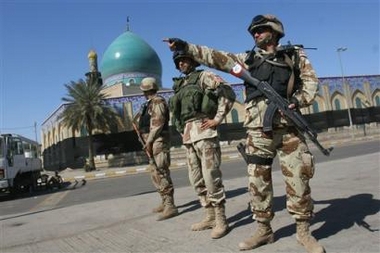|
Iraqi religious leaders call for peace
(AP)
Updated: 2006-02-25 08:58
Appeals from religious leaders and an unusual daytime curfew Friday curbed violence that claimed more than 140 lives across Iraq after the bombing of a Shiite shrine. President Bush joined in calling for calm, saying "This is a moment of choosing for the Iraqi people."

Armed Iraqi army soldiers guard a Shiite mosque, in Baghdad, Friday, Feb. 24, 2006. Police and soldiers blocked major roads and surrounded Baghdad's two main Sunni mosques as streets throughout this city of nearly 7 million emptied of people and traffic. The nation stood on the brink of civil war and the American strategy in Iraq faced it's gravest test since the 2003 invasion.[AP] |
Prime Minister Ibrahim al-Jaafari reached out to Sunnis and Shiites, promising to rebuild the Shiites' Askariya shrine in Samarra and Sunni mosques damaged in two days of reprisal attacks.
The daytime curfew kept most vehicles and pedestrians off the streets of Baghdad, preventing many people from reaching mosques for the main Muslim prayer service of the week but also blunting protests and preventing attacks.
People were allowed to walk to neighborhood mosques, many of which were guarded by heavily armed Iraqi police and soldiers. Preachers at several leading mosques urged their followers to maintain calm for the sake of the nation.
But sectarian anger remained high following Wednesday's destruction of a famed Shiite shrine, as did the threat of more violence.
The Iraqi government announced another daytime curfew for Saturday in Baghdad and the surrounding provinces of Salaheddin, Babil and Diyala. And the U.S. military said it would carry out additional security patrols for another 48 hours.
Late Friday, two rockets were fired in a village southeast of Baghdad that includes a tomb revered by Shiites. There was no damage to the tomb, U.S. and Iraqi officials said. Two more rockets exploded in the British Embassy compound in Baghdad's heavily fortified Green Zone, causing minor injuries to two British workers, the U.S. military reported.
Police found at least 27 bodies Friday in Baghdad and other cities and towns. Many were believed to have been victims of sectarian violence, including five Shiite men killed by gunmen who burst into their home in Latifiyah south of Baghdad.
In Samarra, a roadside bomb killed two policemen, and a husband and wife in a passing vehicle were injured when police opened fire after the attack, police said. An explosion set fire to an oil pipeline south of the city.
In Washington, Bush warned Americans to expect more bloodshed and more political wrangling in Iraq.
"We can expect the coming days will be intense," the president said in a speech to a veterans' group. "But I'm optimistic because the Iraqi people have spoken and make their intentions clear."
"They want their freedom. They want their country to be a democracy," Bush said.
The Shiite-Sunni confrontation threatens to scuttle U.S. hopes for a government that will include Shiite, Sunni and Kurdish parties. The Bush administration hopes such a government can win the trust of the Sunni Arab community, the backbone of the insurgency, calming the violence so American troops can begin heading home.
However, the biggest Sunni political bloc in parliament withdrew from talks on a new government to protest the attacks on Sunni mosques. U.S. officials remain hopeful the Sunnis will return to the discussions, but the crisis may delay forming the government, which had been expected by mid-May.
U.S. Ambassador Zalmay Khalilzad acknowledged the grave danger facing Iraq, but said the attack on the shrine also presented the country with a "moment of opportunity."
"I think this attack has had a major impact here, getting everyone's attention that Iraq is in danger ... that they must lead and compromise with each other to bring the people of Iraq together and to save this country," he told reporters.
In an overture to the Sunnis, the country's top Shiite political leader, Abdul-Aziz al-Hakim, issued a statement expressing regret over the deaths of all Iraqis. He said those who carried out the Samarra attack "do not represent the Sunnis in Iraq," blaming Saddam Hussein loyalists and religious extremists from al-Qaida in Iraq, led by Abu Musab al-Zarqawi.
"This is what al-Zarqawi is working for, that is, to ignite sectarian strife in the country," al-Hakim said in the statement broadcast by Iraqi television stations. "We call for self-restraint and not to be dragged down by the plots of the enemy."
A Sunni spokesman, Dhafer al-Ani, called al-Hakim's statement "a step on the road of healing the wounds." But he said his Iraqi Accordance Front was waiting for an apology for failing to protect Sunni mosques from reprisal attacks.
Supporters of radical Shiite cleric Muqtada al-Sadr met Friday with representatives of a Sunni clerical organization, the Association of Muslim Scholars, to discuss a "charter of honor" prohibiting killings among Iraqis.
Al-Sadr's militiamen were responsible for at least some of the attacks on Sunni mosques, although the cleric joined other Shiite religious leaders in calling for calm. Both al-Sadr and the scholars association strongly oppose the U.S. presence in Iraq.
In his statement, Prime Minister al-Jafaari announced security measures to curb the unrest, including a ban on vehicles entering or leaving Baghdad, more patrols in flashpoint neighborhoods, and a ban on carrying unauthorized weapons.
The vehicle ban in Baghdad was aimed at preventing people from leaving the capital for Samarra, 60 miles to the north and was not expected to be applied vigorously elsewhere, government officials said.
|